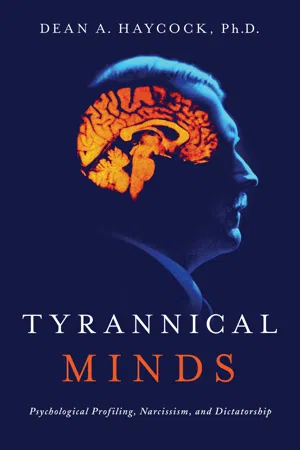
- 336 pages
- English
- ePUB (mobile friendly)
- Available on iOS & Android
About This Book
An incisive examination into the pairing of psychology and situation that creates despotic leaders from the author of Murderous Minds. Not everyone can become a tyrant. It requires a particular confluence of events to gain absolute control over entire nations. First, you must be born with the potential to develop brutal personality traits. Often, this is a combination of narcissism, psychopathy, Machiavellianism, paranoia and an extraordinary ambition to achieve control over others. Second, your dangerous personality must be developed and strengthened during childhood. You might suffer physical and/or psychological abuse. Finally, you must come of age when the political system of your country is unstable. Together, these events establish a basis to rise to power, one that Stalin, Hitler, Mao Zedong, Saddam Hussein, and Muammar Qaddafi all used to gain life-and-death control over their countrymen and women. It is how the leaders of the Islamic State hoped to gain such power. Though these men lived in different times and places, and came from vastly different backgrounds, many of them felt respect for each other. They often seemed to recognize their shared, "dark" personality traits and viewed them as strengths. Only in rare cases did they show signs of mental disorders. "Getting inside the heads" of foreign leaders and terrorists is one way governments try to understand, predict, and influence their actions. Psychological profiles can help us understand the urges of tyrants to dominate, subjugate, torture and slaughter. Tyrannical Minds reveals how recognizing their psychological traits can provide insight into the motivations and actions of dangerous leaders, potentially allow to us predict their behavior?and even how to stop them. As strongmen and authoritarian leaders around the world increase in number, understanding the most extreme examples of tyrannical behavior should serve as a warning to anyone indifferent to the threats posed by political extremism.
Frequently asked questions
Information
ENDNOTES
Table of contents
- Cover
- Title
- Contents
- Preface
- Introduction
- One: Hitler’s Bedfellow
- Two: An Arcane and Secretive Field
- Three: Dangerous Combinations of Traits
- Four: Predict the Tyrant
- Five: “The Nature of His Rule was So Personal”
- Six: Was Mao Zedong a Monster?
- Seven: The “Black Box”
- Eight: “There Must Be People Who Have To Die.” “My People Love Me.” —Idi Amin and Muammar Gaddafi
- Nine: “I Know They Are Conspiring To Kill Me Long Before They Actually Start Planning To Do It.” —Saddam Hussein
- Ten: It Can’t Happen Here
- Eleven: Could It Happen Here?
- Twelve: Conclusions and Warnings
- Appendices
- Sources and Recommended Reading
- Acknowledgments
- Endnotes
- Index
- About the Author